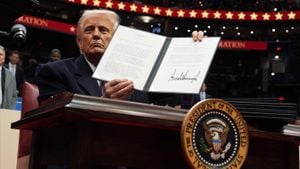For the first time in United States history, Donald Trump welcomed foreign leaders during the inauguration ceremony, signaling his intent to make bold moves both domestically and internationally. On January 20, 2025, as he took the oath of office as the 47th President of the United States, Trump cemented his position as the first former president to regain office after being voted out, following Grover Cleveland's unique path. The ceremony took place inside the U.S. Capitol’s Rotunda due to severe cold weather, and Trump’s inaugural address outlined sweeping changes expected during his presidency.
Trump's inauguration was attended by notable foreign leaders, including China's Vice President Han Zheng, who represented President Xi Jinping, and Argentine President Javier Milei, showcasing the new administration's intention to engage with conservative leaders on the world stage. Other attendees included Italian Prime Minister Giorgia Meloni as well as additional dignitaries from Europe and Latin America, indicating his goal of fostering alliances with international allies.
Upon assuming office, Trump was quick to act, signing around 80 executive orders aimed at repealing key policies set by the previous Biden administration. "We will sign executive orders first to revoke nearly 80 destructive and radical executive actions of the previous administration," Trump declared moments after taking the oath. His initial focus encompassed energy policies, immigration reform, and limits on government censorship, garnering both enthusiasm and alarm.
Trump's immediate actions included declaring a national energy emergency, which allows for expanded drilling operations and the suspension of stringent vehicle emissions standards. Coupled with repealing the electric vehicle mandate and plans to end participation in the Paris Climate Agreement once again, these directives signify residual tensions surrounding climate change discussions and economic policy.
One of the most controversial aspects of Trump's inauguration was his promise to impose punitive tariffs on Canada and Mexico, threatening 25% tariffs as early as February 1 due to accusations of these countries failing to address illegal immigration and drug trafficking. Trump remarked, "We're thinking in terms of 25 percent on Mexico and Canada, because they're allowing vast numbers of people," emphasizing his zero-tolerance stance as he vows to secure the southern border.
Argentine President Milei's attendance highlighted Trump's approach to strengthening ties with right-wing populists globally. Having established good relations with Milei and others, Trump appeared to create significant partnerships aimed at revising international trade agreements and financial engagements. During the inaugural galas, Trump's nominees proposed increased collaboration with Latin American leaders.
Another pivotal move by Trump was the signing of pardons for over 1,500 individuals implicated in the January 6, 2021, Capitol riot. "These are the hostages -- approximately 1,500 people -- for a pardon; we hope they come out tonight frankly," Trump stated, reflecting his continued support for his base and asserting the political narrative of victimization faced by his supporters.
Domestically, Trump reaffirmed the exclusionary policies symbolized by his declaration of "only two genders" recognized by the federal government, vowing to rescind equity and diversity policies he labeled as divisive. This move signifies his adherence to the cultural grievances he rallied against throughout his campaign.
Internationally, Trump's invitation list sheds light on his foreign policy aspirations. While Chinese President Xi Jinping sent his vice president, Trump’s conversation with him emphasized key issues such as trade and fentanyl. Amidst the tensions, his administration pursued dialogues aimed at maintaining cooperation, even as he indicated additional tariffs might be forthcoming.
Indigenous leaders voiced concerns over Trump's border security measures, which sparked outrage from various advocacy groups advocating for the rights of migrants. Critics have predicted legal battles against Trump's ambitious immigration reforms, particularly the prospective end of birthright citizenship.
Trump's administration will prioritize energy independence, economic revitalization, and reshaping America's role on the international stage with his executive orders impacting U.S. relationships significantly. Critics and pundits are already analyzing how Trump's assertive policies and responding stance against his perceived adversaries might shift diplomatic landscapes.
The ramifications of Trump's policies will not only redefine U.S. domestic affairs, but they may also resonate worldwide, affecting alliances and trade conditions with nations standing against his administration's hardline strategies.
Overall, Trump’s second inaugural address and swift actions suggest symbolic and tangible changes awaiting not just American soil but with international impact, as leaders and citizens globally brace for potential shifts poised to stem from his bold declarations.



